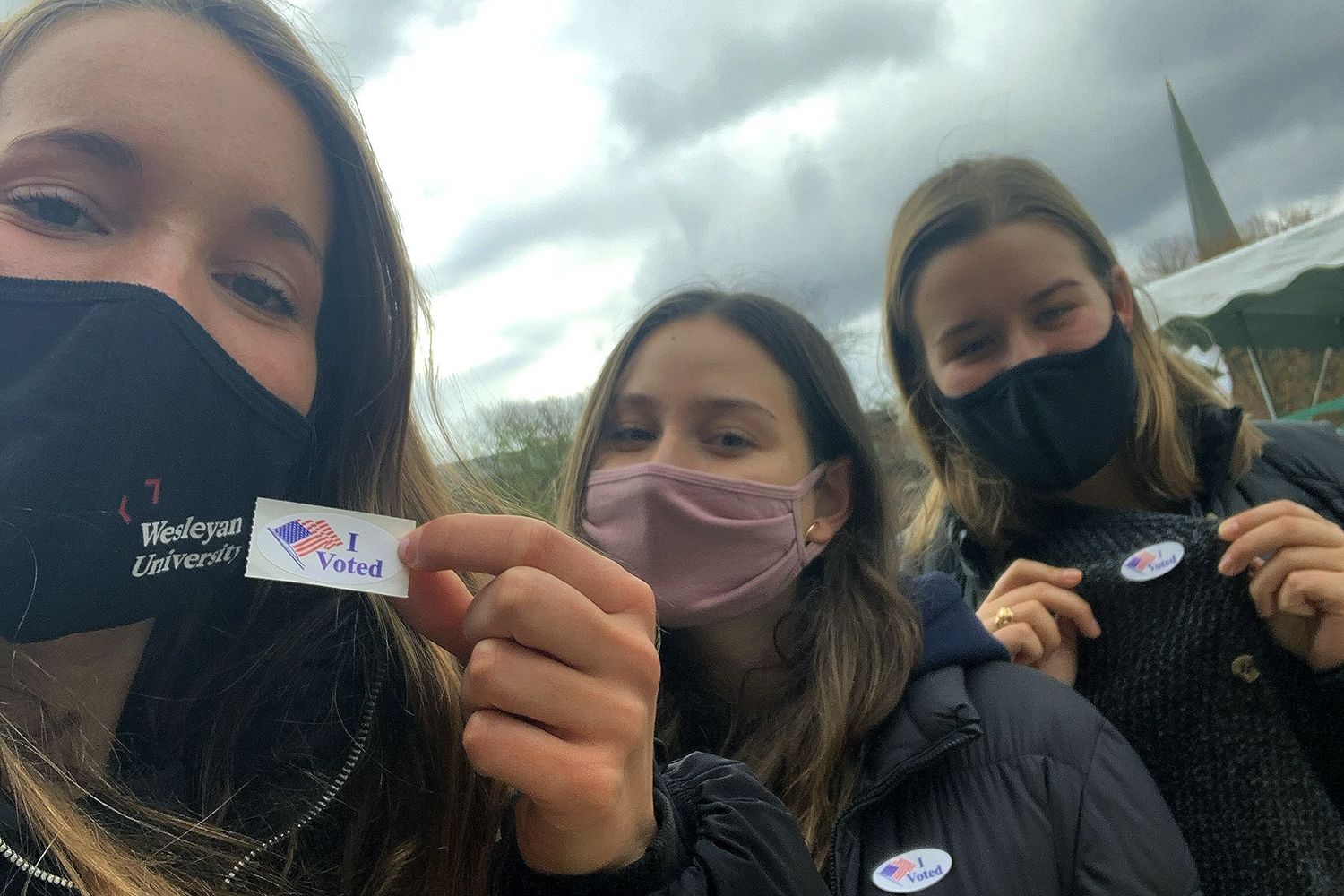Students Reflect on Presidential Election Voting Experience


By Annie Roach ’22 and Olivia Drake MALS ’08
After the whirlwind of 2020, Wesleyan students—many of them first-time voters—were particularly eager to exercise their right to vote in the presidential election. While several students cast absentee ballots in their home states weeks ahead of time, others voted in person on Nov. 3.

Marangela James ’24 decided to vote in person in Connecticut, here on campus at Beckham Hall. She registered at Wesleyan earlier this semester, when some students had set up a voter registration table in front of Usdan. “It was a little bit hard navigating how to vote at first with everything going on,” she said, “but I thought it was helpful that Wes had a table set up to register us.”
Thomas Holley ’22 voted via absentee ballot. However, he physically dropped it off in the election box outside his town hall in Cheshire, Conn. “I mostly chose to vote absentee because of its ease and to avoid crowds on Election Day,” he said. “I voted in the 2018 midterms, but this election feels much more important. This statement comes from an unbelievable point of my privilege, but this is the first time political events have directly impacted my daily life. In 2018, I enjoyed voting, but going to the polls did not have the same sense of necessity.”
In conversations with his peers, Holley feels there is a shared sense of “we have to act now, and voting is the least we can do.” Issues such as climate change, reproductive rights, and the virus have come up frequently in discussions, he said.
Megan Perkins ’23 cast an absentee ballot in her home state of Texas, with hopes that her vote would make a bigger impact there than in Connecticut. “Turning Texas blue would be an amazing thing for this election, and just in general, so I do feel like my vote is making a difference,” she said. “Obviously, neither candidate is ideal, but I am definitely excited that I am able to participate in this election and make my voice heard, rather than just watching the debates and the news/state of our country and feeling powerless.”
Drew Kushnir ’22, of Massachusetts, cast an absentee ballot in his home state. “It was actually a pretty nerve-wracking experience,” he said. He had been tracking the status of his ballot online, but became worried when the website did not confirm the receipt of his ballot. He called his town hall and found out that the clerk had misplaced his ballot application. He waited on the phone until she had rummaged through her papers to find it. Worried that the delay, combined with the widely-publicized problems with the postal service, might result in his ballot coming in too late, he gathered all the necessary documents to vote in person in Connecticut if it came to that.
However, things ended up working out. “Luckily, my ballot came on time and I was able to send it back without an issue. I can see from the website that it has been accepted,” he said.
The response to COVID-19 and issues of racial justice and police brutality were the strongest motivators influencing Kushnir’s vote. “But I would also like to see more aggressive action taken to combat climate change and government corruption,” he said.

Like Kushnir, Carly Blue ’22 decided to cast an absentee ballot in her home state of Massachusetts. “I wanted to be able to vote in the Massachusetts Senate race and on the ranked-choice question,” she said. “This was my first time voting in a presidential election, but it was the same process as voting in other elections—just with way more urgency.”
Blue echoed many of Kushnir’s sentiments, citing gun control, police brutality, women’s rights, and climate change as her most important concerns. “Climate change and gun violence have been impacting our generation the most, and we can use our vote as a way to make actual change,” she said. “Also, equal rights for minorities has been a constant struggle for centuries. We are far beyond needing change, and I’m hoping that the activism this summer leads people to prioritize it and continue to educate themselves.”
Polina Kiseleva ’21, of Florida, voted absentee. “I was excited to vote, especially in a swing state where my vote makes a bigger difference than in a state like Connecticut,” she said.

Mason Polaner ’23, of New York, also voted absentee two weeks ago, feeling it was the safest route possible. Polaner, who identifies as politically moderate, spent ample time researching what both candidates have said and done in the past before casting his vote. He feels the most important issues are the coronavirus, the state of the economy, and fiscal and monetary policy.
In voting for the first time, Polaner felt as though there was “tremendously more weight” on not only himself but also his generation as a whole.
“This is not only based on the tremendously important nature of this election, but also in terms of being able to analyze and apply many of my nuanced political beliefs for the first time,” Polaner said. “I certainly think that my vote will make a difference, especially given the significance and importance of voting that is currently sweeping the nation. Another way that I think of this is, unlike other elections, where the significance of the electoral outcome has been propped up, this is truly the most important one of our lifetime, as the identity, character, and influence of our nation are at stake.”
Nicholas Brattoli ’21, of Illinois, felt “respondent and disaffected” when voting in his first presidential election. For one thing, he had to cast his vote via absentee ballot. Secondly, Brattoli wasn’t pleased with either Biden or Trump as a presidential option. Further, the State of Illinois—and his district—is solidly Democratic, and he wasn’t sure his vote would mean much for the election in general.
Nevertheless, Brattoli decided to cast a vote, noting that he and his peers frequently discuss climate change as a major concern. “This issue is probably about 90% of why I voted for a mainstream candidate at all, instead of, say, Kanye West,” he said.
Brattoli also voted to support a constitutional amendment for Illinois’s constitution, which would allow residents to implement a graduated income tax. “That needs 60% support to pass, and although I doubt it will get that, it would certainly need every vote in order to pass. On the other hand, more abstractly, regardless of what happens nationally and locally at the ballot box, we will continue to live under the dictatorship of capital, so I am not sure how much it matters at that level.”

Hannah Docter-Loeb ’22 voted in Connecticut, though she chose to vote absentee. Although she is from Washington D.C., she ultimately decided against voting there. “I felt as though my vote would matter more coming from [Connecticut], where I could actually make change and vote for a senator and representative, as D.C. only has one nonvoting representative in Congress,” she said.
Doctor-Loeb expressed excitement about being a first-time voter, but also acknowledged that not everyone has the privilege of being in her position. “It’s frustrating that so many people are barred from voting, beyond plain voter suppression,” she said. “Being from D.C., I am very familiar with disenfranchisement, and while D.C. has three presidential electors, other U.S. territories like Guam and Puerto Rico cannot participate in the general election. Not to mention that immigrants and many people with past felony convictions are unable to vote in this important election.”

The 2020 presidential election wasn’t Wesleyan Posse Veteran Greg Hardy ’21‘s first time voting. Yet it was especially important for him, as a father of a 4-year-old, to have his vote counted. At the very least, he believes his vote acted as a historical count against the last four years.
“One issue that strongly matters to me is character and conduct. A lot of my life is wondering about what examples people around my son are setting, especially when we go into public places where we are surrounded by instances and individuals out of our control,” Hardy said. “I also am here at Wesleyan because I hope to earn a degree that allows me to teach (at the high school level), and from that mindset I am also looking at the world through the eyes of what people older than my son but still of school age might see, think, feel, or come to believe from the examples around them.”
Hardy opted to vote in person, hesitant of the mail-in ballot process and appreciative of the fact that his schedule allowed him the luxury to vote on Election Day.
“I would say that my normal feeling on voting is negative,” he said. “I was excited to vote for Obama’s first election because that felt like something. … Now, we’re picking between the best of the worst. I think everyone’s vote matters this year, because it takes large, shocking acts to change the establishment.”

